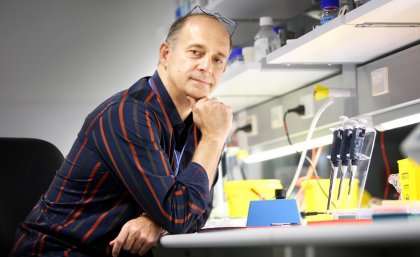Researchers advance autism diagnosis

(Medical Xpress)—University of Queensland researchers have led a study that will help unravel the genetic mystery of autism and, for the first time, help diagnose children under two years of age with the disorder.
Study leader Associate Professor Charles Claudianos, from UQ's Queensland Brain Institute, said genome sequence information from Australian families with autism was analysed using a computer model developed at QBI.
He said the model examined combinations of more than 4000 genes of each child and their parents, and identifies autism risk.
"More than 1000 genes have been linked to autism," Associate Professor Claudianos said.
"Importantly, there are many different combinations of these genes that can actually lead to the disorder and we have found that no two individuals with autism have the same causal genetic signatures."
A key discovery of the study showed parents with mild autism-like behaviours, such as social difficulties, carried autism-risk genes that may be passed on to their children.
Diagnosis of autism across the world is based solely on behavioural profiling of the child, teenager or adult, in a process that takes many months, involves many specialists and is expensive.
Associate Professor Claudianos said this process caused delays in diagnosis and often there was a misdiagnosis and the wrong or ineffective support was provided.
"The computer model is the first step in developing an understanding of the variety of genetic pathways that can lead to autism,'' he said.
"The software helps us make sense of the millions of pieces of information provided by the genes, and understand how these may lead to a person developing autism."
The study was supported by the Cooperative Research Centre for Living with Autism Spectrum Disorders (Autism CRC).
Autism CRC director Professor Andrew Whitehouse, from the University of Western Australia's Telethon Kids Institute, said the development had significant potential to advance clinical practice.
"The aim of the Autism CRC is to improve the life outcomes of people with autism, and one factor that underpins this is an early and accurate diagnosis," he said.
"We are working on earlier and more accurate diagnosis of autism in order to get the right interventions as early as possible.
"Using genetic information produced in this study and other CRC projects, combined with the behavioural information already used to diagnose autism, we will provide a comprehensive road map to accurately diagnose autism in children under two years of age - for the first time."
The full article was published in Translational Psychiatry.
More information: J Y An, et al. "Towards a molecular characterization of autism spectrum disorders: an exome sequencing and systems approach." Translational Psychiatry (2014) 4, e394; DOI: 10.1038/tp.2014.38 . Published online 3 June 2014

















